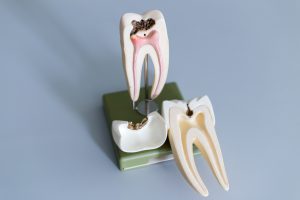 In the more severe stages of tooth decay, the infection in your tooth can progress beyond the main structure of your tooth, known as dentin. When it does, it can reach the hollow part of your tooth, known as the pulp, along with the nerves and tissues inside of it. These tissues travel from the pulp through the root of the tooth, and root canal treatment focuses on ensuring these structures stay healthy enough to support your tooth. Today, we examine the importance of your root canals, and more importantly, the importance of treating one that’s become affected by internal tooth decay.
In the more severe stages of tooth decay, the infection in your tooth can progress beyond the main structure of your tooth, known as dentin. When it does, it can reach the hollow part of your tooth, known as the pulp, along with the nerves and tissues inside of it. These tissues travel from the pulp through the root of the tooth, and root canal treatment focuses on ensuring these structures stay healthy enough to support your tooth. Today, we examine the importance of your root canals, and more importantly, the importance of treating one that’s become affected by internal tooth decay.
They support your teeth in several ways
The main purpose of your tooth’s root is to support the tooth, which it does in several ways. By staying securely within your jawbone, it supports the crown of your tooth while it absorbs the pressure of your bite. Inside the root, the canal offers a way for your jawbone to send your tooth essential nutrients.
They can become infected before you know it
While tooth decay is often obvious for the discomfort it causes your tooth, many patients don’t realize that it’s become serious enough to infect their pulp and root canal until it’s too late. The problem is that the infection is progressive, and internal decay is one of its more severe forms. Root canal treatment may save the tooth, but only if you seek treatment within a certain period of time.
They can allow tooth infection to spread
In extreme cases of decay, the infection in your tooth may have a chance to spread beyond the root canal and into the jawbone structure that supports the root. This can lead to severe and complicated oral health issues, which is why your dentist may recommend extracting the tooth if it’s too late to save it with root canal treatment.
Find Out if You Need Root Canal Treatment
Root canal treatment is often misunderstood until patients undergo the procedure and realize how simple it can be. To find out more about root canal treatment, schedule a consultation by calling Cedar Dental in Cedar Rapids, IA, today at (319) 364-7108. We also welcome patients from Mount Vernon, Iowa City, Hiawatha, and all nearby communities.




Recent Comments